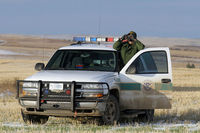Hurricanes, Citizenship, and the Makings of an Unnatural Disaster
May 20, 2008
People in the Rio Grande Valley were rattled last week by reports that the federal government was planning to do something very, very stupid the next time a hurricane came bearing down. The word was out that the Border Patrol would be checking citizenship at evacuation centers, screening out illegal immigrants before evacuees boarded buses.
Written by Editorial, The New York Times

People in the Rio Grande Valley, on the southern tip of Texas, were rattled last week by reports that the federal government was planning to do something very, very stupid the next time a hurricane came bearing down.
The word was out that the Border Patrol would be checking citizenship at evacuation centers, screening out illegal immigrants before evacuees boarded buses. Who cares if it's a hurricane — it would still be "business as usual" for the Border Patrol, the agency's local spokesman said.
Wow. That's hard-core. Even in a country that is becoming inured to the relentless pursuit and harassment of undocumented immigrants, it is mind-boggling to consider what the spokesman, Dan Doty, was suggesting:
Winds may be howling, floodwaters rising and rescuers in McAllen and Brownsville scrambling to get 100,000 to 150,000 sick, elderly, poor and disabled people to safety as quickly as possible — but if Grandma doesn't have her papers, she isn't getting on the bus.
At least not the happy bus.
"We do have safe places for processing and detention during times of a hurricane," Mr. Doty was quoted as saying in an online newspaper, The Rio Grande Guardian. The Guardian article, about a hurricane evacuation drill on May 13 at the McAllen Convention center, ran with a photograph of a uniformed Border Patrol agent examining identification papers.
As the story spread, with Mr. Doty telling local and national news outlets that the Border Patrol would never abandon its mission, come hell or high water — literally, in this case — government and emergency-management officials in the region reacted with understandable dismay.
We talked to Kevin Pagan, city attorney and emergency management coordinator in McAllen, who took time to explain two things that really shouldn't need explaining:
1. Checking papers slows things down, which is never good in a mass evacuation from a natural disaster. The problem is "the level of complexity that it adds to a pretty darn complex process," Mr. Pagan said.
2. If you force illegal immigrants to choose between possible drowning and certain imprisonment and deportation, a lot of people will take their chances. Family members will stay behind with undocumented loved ones. And people will die.
"Think about the types of people that we will be evacuating, the people who can't evacuate themselves — lower income, mostly Hispanic — the chilling effect that it's going to have on those people," Mr. Pagan said.
Mr. Doty and his higher-ups have since backed away from the stark implications of his earlier comments. Lloyd Easterling, an assistant chief with the Border Patrol in Washington, said that the media and local officials had "misconstrued" what Mr. Doty said — that despite what the photograph seemed to show and what participants claimed, no agents at the drill had checked anyone's citizenship status. Nor would they in the future, Mr. Easterling said.
Later, he was emphatic: "No enforcement roles will be undertaken in any way shape or form that will impede the safe evacuation of anyone."
It would have been more reassuring if Mr. Easterling had simply said that the Border Patrol would suspend enforcement during an emergency as dire as a hurricane evacuation. But he didn't. He said existing checkpoints would stay open, and that the agency would use its best judgment as to when to screen evacuees, and when to get out of the way.
If you were an undocumented immigrant, would you feel reassured? We didn't think so.
Mr. Pagan was diplomatic in saying that during a disaster he would take help wherever he could get it, and that even the Border Patrol was welcome to pitch in.
We got the impression that this meant filling sandbags and putting out traffic cones.
![]()
![]()
Related Stories
![]()
Fair Use Notice
This site contains copyrighted material the use of which has not always been specifically authorized by the copyright owner. We are making such material available in our efforts to advance understanding of environmental, political, human rights, economic, democracy, scientific, and social justice issues, etc. We believe this constitutes a "fair use" of any such copyrighted material as provided for in section 107 of the US Copyright Law. In accordance with Title 17 U.S.C. Section 107, the material on this site is distributed without profit to those who have expressed a prior interest in receiving the included information for research and educational purposes. For more information go to: http://www.law.cornell.edu/uscode/17/107.shtml. If you wish to use copyrighted material from this site for purposes of your own that go beyond "fair use", you must obtain permission from the copyright owner.